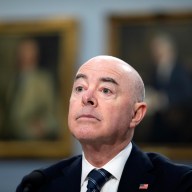OTTAWA – Sow’s ear, meet silk purse.
The Conservative government is set to officially submerge Canada back into red ink Tuesday after 12 years in the black when Finance Minister Jim Flaherty presents his 2009-2010 “Plan of Action.”
It will be pitched as the collective budgetary wisdom of an unprecedented cross-Canada consultation, an unwelcome but wholly necessary, unavoidable and temporary detour into red ink in the interests of priming the economic pump.
“There can be no pride of authorship, only the satisfaction of identifying solutions that will work for all Canadians,” Gov. Gen. Michaelle Jean intoned from the throne speech Monday to reopen Parliament.
Did Prime Minister Stephen Harper stifle an ironic grimace as he listened to his own party line?
Given Harper’s history, one has to believe so.
He’s a trained economist whose Masters thesis poured cold water on Keynesian spending policies. He helped found the Reform party with its bedrock principles of small government and balanced budgets, and he served as the head of the right-wing National Citizens Coalition.
“This is a survival document,” Peter Woolstencroft, a conservative political scientist at the University of Waterloo, said Monday.
“If the Conservatives had a majority, would they be doing this? I don’t think so.”
As proof, Woolstencroft points no further than November’s economic statement, when a freshly elected and emboldened Harper minority government was promising to slash spending and sell off government assets, while holding out stimulus spending only if necessary.
“These measures will enable us to plan on a balanced budget framework, while recognizing the potential downside risks,” Flaherty read in the Commons on Nov. 27.
Exactly two months later and facing the threat of defeat in the Commons, the Harper government is tabling a budget with a $34 billion deficit this year and another $30 billion in 2010-11.
“The economic stimulus plan will be a plan of action,” said Monday’s throne speech.
“It sure speaks to me mostly about the business of politics and the effort to prolong the life of a Parliament,” said Kevin Gaudet of the Canadian Taxpayer’s Federation, who watched Harper’s work first-hand during five years in the office of Reform party leader Preston Manning.
Harper has never, ever expressed “a genuine belief or interest to so-called ‘stimulate’ an economy,” said Gaudet. “I mean, that’s language we’ve never heard him use before.”
Yet stressing words like action and stimulus may prove smart messaging for a government that wants to take the focus off all that red ink.
After all, parliamentary budget officer Kevin Page reported last week that some $13 billion of the 2009-10 deficit has nothing to do with any new stimulus package, but is the result of falling government revenues and unabated program spending.
Canadian public opinion has come around to the notion of deficits, said pollster Nik Nanos, but only out of a sense of proactive necessity.
“Canadians are going to want to know how much of this $64 billion deficit is actually going to go to protect Canadian jobs and help Canadians through this downturn, and how much is a result of other operational decisions the Conservative government made,” said Nanos.
“And I think that’s where the Conservatives are likely vulnerable.”
Nanos suggests Harper express deep reluctance at prescribing unpalatable but necessary medicine, kind of like the popular cough syrup ads.
“It doesn’t taste good, but it works,” said the pollster. “That’s probably the best way the prime minister can frame this.”
The problem, say some conservatives, is that Harper has always argued that such prescriptions don’t work at all.
“This (budget) is going to be a disaster for Stephen Harper,” said Gerry Nicholls, who worked with Harper at the National Citizens Coalition.
“It will shatter his credibility because just a couple of months ago he was talking about balanced budgets. He’s doing a complete 180.”














